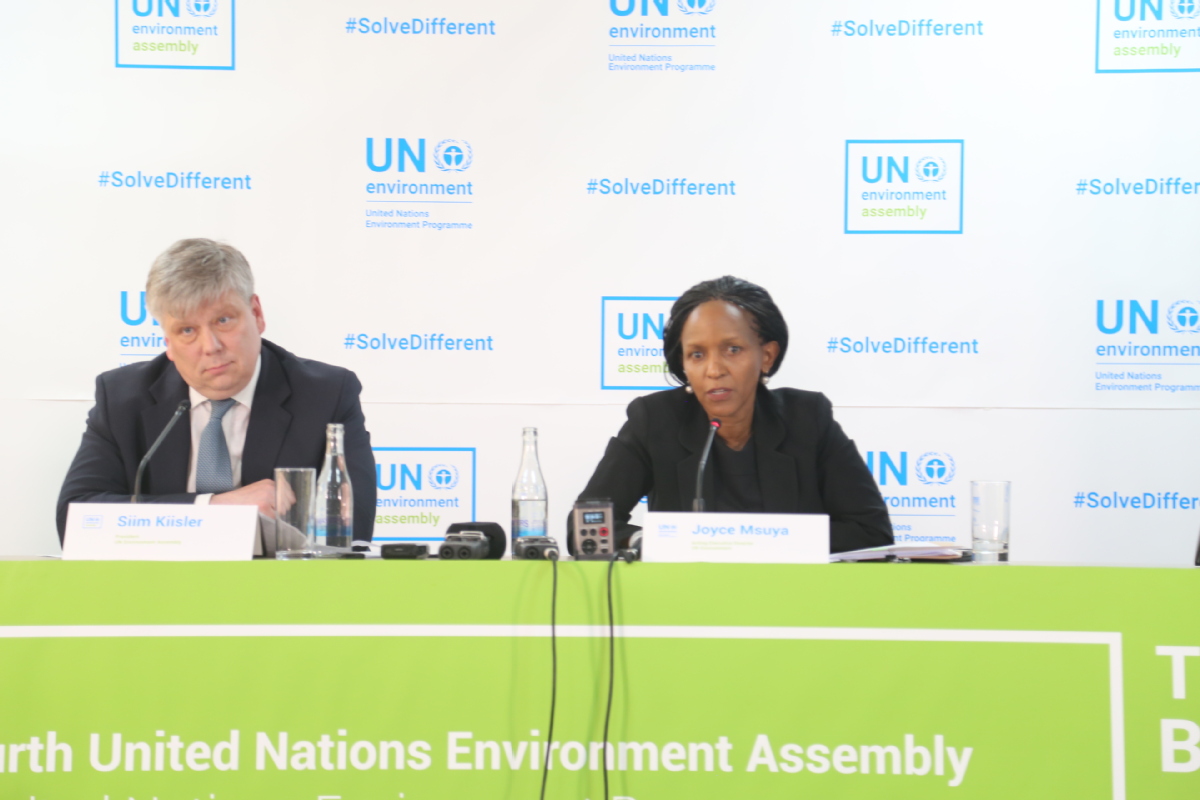UN Environment assembly kicks off in Nairobi
By Edith Mutethya in Nairobi, Kenya | chinadaily.com.cn | Updated: 2019-03-12 02:51

Over 4,700 participants from 170 countries, including ministers, business leaders, senior UN officials and civil society representatives are gathering in Nairobi, Kenya for the fourth session of the United Nations Environment Assembly (UNEA), where they are expected to make commitments that would move global communities to a more sustainable path.
The forum that runs from March 11 to 15, 2019, under the theme of innovative solutions for environmental challenges and sustainable consumption and production, is expected to yield bold decisions and outcomes.
The resolutions are expected to push for sustainable consumption and production patterns, commit to the protection of the marine environment from plastic pollution, and reduce food waste. This is in addition to advancing technological innovations that combat climate change as well as reduce resource use and biodiversity loss.
Speaking during the opening ceremony, Siim Kiisler, the President of UNEA and the Estonia's Minister of Environment, said results in global environmental policy can only be achieved in collaboration.
"We meet at a time when major scientific assessments such as the Global Environment Outlook (GEO-6) to be endorsed at this assembly are highlighting that we have reached a crucial tipping point," he said.
Kiisler said a major species extinction, compromising planetary integrity and Earth's capacity to meet human needs, is unfolding and mega-trends are being established.
"Our planet is increasingly polluted, affected by the adverse effects of climate change, quickly losing its biodiversity and experiencing widespread environmental degradation," he said.
Over the last four years, Kiisler said news about flash floods, droughts, violent hurricanes, sand and dust storms, accompanied by tragic loss of human lives have been familiar across the globe.
"Unless we take action now, we will not be able to reverse these mega-trends, thereby protecting human and environmental health and maintaining current and future integrity of global ecosystems. Consequently, many of the sustainable development goals will not be met," Kiisler said.
As president of the assembly, Kiisler said his vision is to scale-up the efforts to overcome common environmental challenges in a balanced and integrated manner through identifying and developing innovative solutions.
He noted that two billion people worldwide lack access to solid waste collection services, while 64 million people are directly affected by uncontrolled dumping and open burning at dumpsites. Additionally, eight million tons of plastics enter the ocean every year.
In the draft ministerial declaration, Kiisler is calling on member states to define ambitious national targets for reducing waste generation, increasing the reuse of products and recycling of waste and to significantly reduce single-use plastic products by 2030.
"With the ministerial declaration, I am asking UNEP to develop a global environmental data strategy by 2025 and member states to improve national environmental monitoring systems and technologies. Not only is data filling knowledge gaps, but can also be a source of economic benefits which cannot be left unnoticed," he said.
Kiisler said this year's environment assembly embodies the notion that challenges are best addressed and opportunities realized when the community of nations and citizens of the world join forces to promote economic prosperity, social equity, and environmental sustainability in a holistic manner.
Joyce Msuya, the Acting Executive Director of UN Environment said it's time to take action to protect people and the planet.
"It is clear that we need to transform the way we live, how we produce and the choices we make. We have grown at the expense of nature and it is time to take a 360 degree u-turn," she said.
Last year, the Intergovernmental Panel on Climate Change released a report saying that climate-warming emissions must be quickly and drastically reduced. A few weeks later, UN Environment's Emissions Gap Report concluded that, in order to avoid a rise of more than 1.5 C in global temperatures, there is need to step up climate action five times.
To address that challenge, Msuya said there is need to move quickly to a low carbon, green economy that by 2050 reduces fossil fuel use by 80 percent.
"Two, it is time to be kinder to the environment in how we produce food, reducing the environmental impact of food production by two thirds. Three, we need to achieve a near- zero waste economy by 2050. Circularity must be the driving force of the future we want," she said.
She said the presence of almost 100 ministers of the environment in the assembly, demonstrates that political will is not in short supply. "Partnerships will be the glue that bind us together because a healthy planet depends on us all," she said.
Msuya said policies and incentives to spur innovation and sustainable consumption and production must be backed by efforts to build implementation capacity.
"I'm proud that we will have many civil society organizations, governments, social enterprises and companies here at the assembly who will be demonstrating the power of innovation in reducing poverty, powering businesses and achieving sustainable development," she said.
























